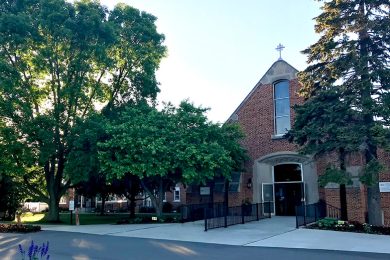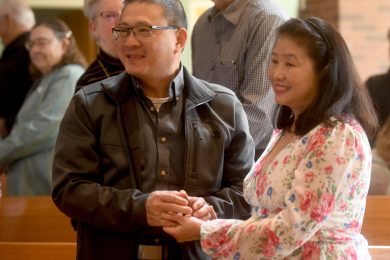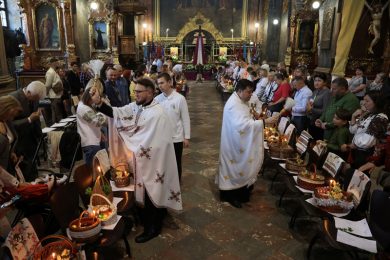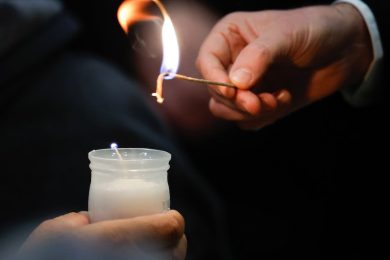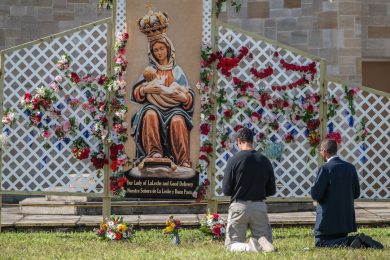Each month, The Central Minnesota Catholic features a big question the Church is facing. April’s question is: “What should we do about the ‘nones’?” Weighing in on this month’s topic are Ryan Parsons, an educator and evangelist from Sauk Rapids; Matt Reichert, director of outreach and engagement at GIA Publications, Inc., and an instructor at the College of St. Benedict in St. Joseph and St. John’s University in Collegeville; and Molly Johns, associate director of campus ministry and parish life at Christ Church Newman Center in St. Cloud.
Q: Ryan, we’ve been hearing a lot of talk in recent years about “nones.” What does the term mean for someone who maybe isn’t familiar with it?
RYAN: The nones are individuals who don’t affiliate with a particular religion. I think agnostics and atheists also are grouped into that description.
Q: Matt, what are some of the statistics regarding nones today? Are their numbers increasing? and, if they are, what’s the cause of that? Is it a problem for the Church?

MATT: The group is increasing. If you think about it, it’s sort of pyramidal. For example, maybe 20% of a generation doesn’t have a particularly strong religious affiliation. Then that 20% raises the next generation, who also doesn’t have a religious affiliation. And, that gap starts to widen. Depending on which study you look at, there’s something like four and a half out of every 10 adults in the United States today claiming no religious affiliation.
For the first time, in the last year or 18 months, the number of former Catholics is now larger than the number of people who claim to be Catholic in the United States. So, this is certainly growing. It feels like a problem. This is the rise of what some people call functional atheism in the sense that if I’m a young person today who grows up without the cultural context for faith, I’m not practicing, I’m not affiliated, I’m not connected. I also don’t know what I’m not connected to. I don’t know what I’m missing. The example that I like to give is something like — depending on the study you look at — 40% or 45% of middle-school and high-school students are not familiar with the common practice of saying a prayer before meals because they just don’t do it.
This gets to the issue of the way the church forms people. It’s built expecting a common experience and common practice. Now, we have a segment of the population that does not have that common experience and practice. And so, there’s an opportunity, but we have to reframe the way we speak to, or speak about or connect with that group of people.
Q: So, what’s causing this great shift in religious connection?
MATT: There are probably as many answers as there are people. I think some of it is secularization. Some of it is privatization. A lot of people think about their experience of faith as a private matter, so they don’t speak about it and doesn’t become part of the cultural context. … We also have pluralization in the sense that in the internet age, any philosophy seems to be as good as any other.
Q: Is there a difference between nones who are unaffiliated with any particular religion maybe since birth, and nones who are disaffiliated — who made a conscious break with religion in general or the Catholic Church in particular?
MATT: St. Mary’s Press did a study of disaffiliation among young Catholics called “Going, Going, Gone.” It’s one of the first major studies of that group of people — those who grew up Catholic and who no longer claim to be Catholic — and to ask why. It found that the average age of disaffiliation is 13, which is fascinating because I think so many people think you come [to college] and Mom isn’t there to make you get up on Sunday morning. So you don’t go [to church] and so therefore you disaffiliate.
What I think is interesting about that is there is a big segment then of young people who are probably in our pews on Sunday because they have to go, their family goes, but who are in fact disaffiliated. They’ve unplugged. So, I think there is a difference. But the disengagement, if they no longer claim a religion, is going to lead to an expansion of nones [in] the next generation.
Much of the research shows that young people in this generation — Generation Z and whatever comes after it — are not a generation of people who don’t care about things. They really ultimately care about a lot of the things that the Church also cares about. A lot of the dispositions socially toward helping other people, toward volunteerism, giving back, you name it. Even belief in things bigger than themselves that the Church has to offer.
I think sometimes younger people who disaffiliate, this research seems to suggest, don’t get a sense that there’s a place for them. If we think about when we were 13, there were probably things that we experienced that 13-year-olds of today experience. Also, there are probably things that 13-year-olds today experience in ways that we never experienced. To what extent are we as people who minister to them aware of that? And, to what extent do we honor their particular experience? If I’m 13 and I go to a church community to find answers and support, does it seem like my life experience is reflected well there or not? Because, if it’s not, they’re living in a time when they can go someplace else to find it. I think the reason people disengage is because that they don’t feel there’s a place for them that matches or meets or feeds their lived experience.
Q: So what’s the lesson for the church? What could it be doing, or doing better? So we need to change how we are doing ministry?

RYAN: My focus with the nones is on the ones who have fallen away because they disagree with the Church. There are a bunch of numbers about how many people disagree with the teachings of the Church or just don’t agree with the position the Church takes on different issues. So, to your question about what we do about that, I don’t think we as a Church try to out-Walmart Walmart. We don’t try to change and be the next parish or next diocese with the best app, or the best website, or the best program. I think we do what we’ve done for 2,000 years, which is show people remarkable examples of what Jesus Christ can do through them if they allow grace to come through their life.
And, that doesn’t mean anything flashy, but it means different things at different stages of life. I think we’re looking for those saints who are 13 years old to minister to 13-year-olds. We’re looking for the saints who are married with five kids to minister to those sort of people. So, I don’t think we need to change anything. We need to fortify the foundation of our faith.
A lot of people say, “The church teaches this. The church teaches that.” In my experience, the Church doesn’t teach very well. The Church teaches very poorly. I think we need to make sure our Catholic schools produce people who are on fire for the Catholic faith. Because, at the end of the day, it’s the Truth. It’s not a marketing plan. It’s not anything but what people are already looking for. We don’t need to run from that. So, why are people running away? It’s because they don’t realize what they’re running away from.
Q: So is a different approach needed for faith formation? For evangelization? For conveying the truth?

MOLLY: I agree the whole approach to catechesis has been challenged. An important thing is just letting adults and youth today ask the “Why?” Or just to be able to wrestle with some of the challenges they find in some teachings to learn more, to grow deeper, to have open discussions. And, to have people in leadership not be scared to answer some to those questions and to enter into that uncertainty or challenges that people have.
I remember, during my confirmation prep, we were sitting with a catechist and my friend next to me said, “Well, why do we believe that?” I looked at her horrified. “You can’t ask why. They tell you what we believe and you listen.” But, the catechists were happy. They were like, “Oh, good. Somebody’s listening. Somebody’s engaging.” Their response of just being happy to dig in and discuss that more or discuss the reasons why really set the tone: “Oh. We can ask questions here. We can better understand.”
I think, too, within the culture there’s just so many ideas of what the Catholic Church teaches, and I don’t think a lot of people necessarily take the time to really dig into, “Why?” “Where did this come from?” “What did these holy people in the past share with us about what they experienced through prayer?” And better understanding that.
Q: Molly, you work with young adults that you encounter here. Ryan, you teach confirmation classes. What do you hear from them? What are their questions? What are they looking for?
MOLLY: My initial thought is peace and the quiet. Time for prayer. To actually have a purpose or reason to put their phones away and to be in silence. There’s so much noise in our current culture. I find myself in that, too. You get five minutes and you end up scrolling through your phone checking email or doing whatever. We have praise and worship after our student meals. Just having that time where their brains can rest in prayer and connect to God. And, when we have adoration, they can just be there in silence praying. That’s a different experience than what they can get in other places right now.
RYAN: In teaching as well, I think students gravitate toward two things. The first one is students have to know the boundaries, the limitations. So, they thrive once they know what is expected of them and what’s true. I think they look for that.
If you tell people what the meaning of life is, and it’s from St. Thomas’ “Summa” or something like that, they will gravitate toward that. I don’t think we need to have such a low bar of expectations for our youth. I’ve had students in public school meet me before school with copies of the “Summa” telling me how they read it with their parents the night before because they were so excited about the ways of knowing God.
So, when you present the big sophisticated things of Catholicism, the doctrines of Catholicism, to our young people, I think they can handle it. They want to handle it. They’re looking for that in a world that’s so dumbed down that it’s almost condescending. I hear a lot that “homilies need to be shorter.” No. We have people watching three-hour YouTube videos on the book of Genesis. Right? Or, three-hour YouTube videos on anything they want. If you give them something of substance and convey it in an energizing, life-filled way, that’s what people are looking for.
The next thing is I think people are looking for life. There are so many people who are just zombies to their devices, or schedules, or their finances or whatever it is. People will go where there’s life. If we as Catholics can keep the culture at bay and really hone in on the fact that Jesus came to give us life and life to the full then I think that’s what will draw people in. From there we can start talking about everything else. If we — you and I and everybody else — if we’re not engaging, and vulnerable, and honest then we shouldn’t expect other people to show up in our pews and join us.
Q: For parents who have kids at home who they’re still bringing to Mass and parish activities, what’s some advice for them to keep their kids interested in the Church and in their faith?
MOLLY: I think being willing to engage in dialogue. I was honestly way too old once I realized that if you listened at Mass it went a lot faster. I remember I had to pick up the responses eventually. My mom knew them but she never thought to say them more into my ear so I understood what people were saying when the whole congregation was replying. I didn’t always pick up on what the prayers were.
So, I think it’s important to help your child to feel connected. Even asking your kids, “What did Father say today that kind of stuck out to you?” Just that will help them make the connection of, “Oh, I’m supposed to be participating. This isn’t just happening to me.”
RYAN: I would offer to be careful how you talk about the Church. If it’s something that is always drudgery and it’s never anything that has an impact on your life, and if everything is negative, that’s not going to be helpful.
MATT: I think more than ever people need to be honest and transparent with their own faith experience and process. … Oftentimes the structure that’s been suggested, whether it’s our parents, or those of us who had religious sisters or pastors as teachers, the model is like they figured it out. They know how to do it. They’ve got it down. As though, this is like one particular skill that once you’ve got it, you’re good. That, of course, belies the fact that this is all a process for us to grow in our faith and to come to know Christ. The more that we can model this and demonstrate this, it’s helpful because we all are figuring this out, and there are ways for us to figure things out to find the information to better understand things.
I think always leaving room for openings and invitation is really helpful. Bob McCarty [a co-author of the “Going, Going, Gone” study] oftentimes talks about how Planet Fitness and other places like that do a good job of recruiting people where the Church does not. Their taglines are things like, “Where people miss you when you’re gone.” … I think of this process of accompaniment, which is not permissiveness, but it’s “walking with” and “journeying with.” I wonder: When’s the last time a young person ran into somebody in the grocery store who said, “Oh, I really missed seeing you at Mass last weekend.” If we don’t have those openings for invitation and opportunities to come back, and to discover and reengage, then we have a problem, too.
Q: Do we have to get a little better at telling our own personal story?
MATT: It’s hard to tell somebody how important something is if we also don’t have our own reason for why we think that it’s important. … I think if we don’t have our own elevator pitch, like, “Bro, you should come to church.” “Why?” “Well, this is why I go. This is why this is important to me. This is why it’s important to me to identify as Catholic.” That’s a good place to start.
///////////////////
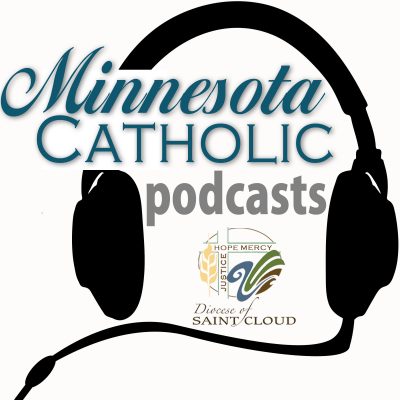
Minnesota Catholic Podcasts
April 2020
The following podcasts will be posted in April. You can access them by visiting www. TheCentralMinnesotaCatholic.org and clicking on “Minnesota Catholic Podcasts.” You also can subscribe to Minnesota Catholic Podcasts on iTunes or Google Play.
Topic: Why are young people leaving the Church, and what can we do about it?
Guest: John Vitek, co-author of “Going, Going, Gone,” the landmark report on why young people leave the Catholic Church based on a comprehensive national study conducted by the Center for Applied Research in the Apostolate at Georgetown University and Saint Mary’s Press.
Vitek discusses the report and what its findings mean for parents, pastors, parish leaders and Catholic schools.
Topic: America’s ‘loneliest generation’
Guest: Josh Packard, executive director, Springtide Research Institute, is an expert on the sociology of religion and new forms of religious expression, talks about the institute’s newest study, “Belonging: Reconnecting America’s Loneliest Generation” and its implications for faith communities.
///////////////////
Question for reflection
After reading the roundtable discussion about ‘nones,’ what do you believe is the best way to engage or re-engage young people who are disconnected or disaffiliated from the Church?
You are invited to submit your answer (150 words or less) to editor Joe Towalski at jtowalski@gw.stcdio. org. A sampling of answers will be published in a future edition of The Central Minnesota Catholic.
////////////////////
Readers respond
Each month, The Central Minnesota Catholic invites readers to reflect on a “Big Question.” Two readers responded to March’s question: “Have we lost our sense of sin?”
“In the March issue of The Central Minnesota Catholic you had the panel discussion on ‘Have we lost our sense of sin?’ A few points: First we must define sin, and it’s not a list. ‘All evil is selfishness and all selfishness is evil.’ As Christians and Catholics, we call evil deeds sins. I like the word ‘evil’ because some people think ‘sin’ is a made-up word, but almost everyone agrees that there are evil acts. Hate is not the opposite of love, selfishness is. Selfishness is when we put ourselves ahead of others. Sometimes we justify our sin by making excuses like, ‘I don’t have time’, ‘I’m late,’ ‘Who does it hurt?’ ‘I need to…,’ etc.
“Jesus’s Passion was the ultimate unselfish act and he taught us to be unselfish: ‘The first shall be last and the last shall be first.’ I would also like to ask Father Becker if he can find any sin that is not selfish or any selfish act that is not sinful. I don’t think there are any. I think we need to change the way we think about what sin is, that it’s putting ourselves ahead of others.”
MIKE NIX
Royalton
“I think our society has lost its sense of what sin is. At best, we know the basics. If one thinks about it, all the commandments deal with wrongs done to the community. If we lie, steal, kill and sleep with the neighbor’s spouse, trust within the community is fractured. A community, be it the nuclear family, neighborhood, village, town, city or country, all have trust as its basis. What happens if you look outside the basics? What happens if you look at any harm one has done to the community? As a dairy farmer, I ask myself, ‘Have I supported the local community with my purchases? Have I looked at my neighbor’s land for purchase at a price that makes entry into farming of a young family impossible? Are we supporting environmentally enhancing farming methods with our purchases? Are we physically and psychologically supporting young families with encouragement?’
“Without a flourishing young family culture, we are doomed. That is a sin on the present generation that will affect future generations. My sin is ever before me. Our sin is ever before us! We can alleviate some of the future suffering by encouraging young growing families. History is rich with cultures that rose and died. Most times it was the sins against family, community and environment that did them in. A literal hell to pay.”
MARTIN PRIMUS
Sauk Centre

